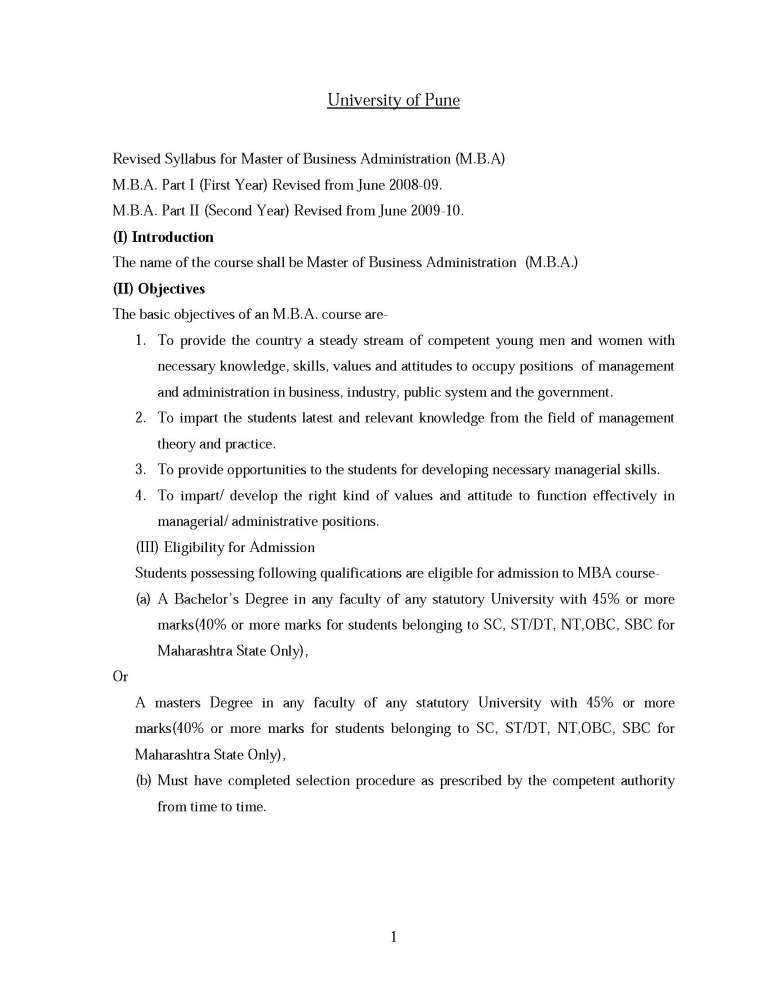|
#5
27th November 2019, 10:25 AM
| |||
| |||
| Re: Revised M.B.A Syllabus Pune University
The syllabus of Master of Business Administration (M.B.A) Program offered by Savitribai Phule Pune University is as follows: Semester I (101) ORGANIZATIONAL BEHAVIOUR & PRINCIPLES & PRACTICE OF MANAGEMENT SECTION I:- Organizational Behaviour 1. Introduction to Organizational Behaviour: Definition, Importance, Scope, Fundamental Concepts of OB, Different models of OB - autocratic, custodial, supportive, collegial and SOBC. 2. Personality & Attitudes: Meaning of personality, attitude - Development of personality – Attributes of personality- Transactional Analysis – Ego states – Johari window - Nature and dimensions of attitude – Developing the right attitude (4) 3. Motivation: Definition, Importance, Motives – Characteristics, Classification of motives - Primary & Secondary motives. Theories of Motivation - Maslow’s Theory of need hierarchy - Herzberg's theory. Morale - Definition and relationship with productivity - Morale Indicators. (4) 4. Group Dynamics and Team building: Concept of Group & Team. Theories of Group Formation - Formal and Informal Groups. Importance of Team building. (4) 5. Conflict Management: Definition. Traditional vis-à-vis Modern view of conflict – Types of conflict – Intrapersonal, Interpersonal, Organizational. Constructive and Destructive conflict. Conflict management. (3) 6. Stress management: Definition, Causes, Managing stress, Stress as a motivator. Work life balance. (2) 7. Change management: Concept of change, change as a natural process, Importance & Causes of change – social, economic, technological, organizational. Learning – unlearning, Concept of learning organizations. (4) 8. Cases studies on above topics (5) SECTION II: Principles and Practice of Management 1. Basic concepts of management: Definition – Need and Scope – Different schools of management thought – Behavioural, Scientific, Systems, and Contingency (4) 2. Contribution of Management Thinkers: Taylor, Fayol, Elton Mayo (4) 3. Functions of Management – a) Planning – Concept, Nature, Importance, Steps, Limitations, Management by objectives (2) b) Organizing - Concept, Nature, Importance, Principles, Centralization, Decentralization, Organization Structures- Line and Staff Authority, Functional, Product, Matrix, Geographical, Customer, New Forms of Organization – Virtual, Organizations as Networks - Types of Network Organizations/Clusters - Self- Organizing Systems. Organizational Designs for Change and Innovation - Designing Principles for New Forms of Organizations (3) c) Staffing - Concept, Nature, Importance, Steps. Concept of knowledge worker. (2) d) Directing – Concept, Nature, Importance. (1) e) Controlling - Concept, Nature, Importance, Process of controlling, Control Techniques. (2) 4. Leadership: Concept, Nature, Importance, Attributes of a leader, developing leaders across the organization, Leadership Grid. (4) 5. Decision making: Concept, Nature, Importance, and Process. Types of decisions. Problems in decision making. (4) 6. Case Study: Planning, Decision Making, Leadership. (4) Books Recommended:- 1. Organizational Behaviour, 9th Ed. - Stephen Robbins 2. Human Behaviour at work - Davis and Newstorm 3. Organizational Behaviour - Uma Sekaran 4. Organizational Behaviour - Fred Luthans 5. Organizational Behaviour - K.Aswathappa 6. Human Behaviour at Work - Keith Davis 7. Organizational Behaviour - Jit S.Chandran 8. Human Relations & Organizational Behaviour - R.S.Dwivedi 9. Organizational Behaviour - McShane 10. Organizational Behaviour - Sharma 11. Essentials of Management – Koontz – TMGH - 12. Principles & Practices of Management - Saxena 13. Principles and Practices of Management - Shejwalkar and Ghanekar 14. Management Concepts & Practices - Hannagan Syllabus M.B.A Program Savitribai Phule Pune University     |